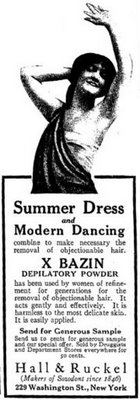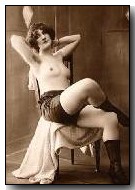 The divine Sarah She always covered her upper arms and legs
The divine Sarah She always covered her upper arms and legs The early ads were very different from what was considered normal for the time. Here is an early ad from 1915
The early ads were very different from what was considered normal for the time. Here is an early ad from 1915
Here is a very naughty Victorian picture...as you can see in this 19th century view underarm hair was in vast abundance
 A scene from D.W. Griffith's Intolerance of 1916..There were many scenes of women without underarm hair...It was a major moment in movies
A scene from D.W. Griffith's Intolerance of 1916..There were many scenes of women without underarm hair...It was a major moment in moviesI have taken some info from the Journal of American Culture by Christine Hope bearing the grand title "Caucasian Female Body Hair and American Culture."
The gist of the article is that U.S. women were browbeaten into shaving underarm hair by a sustained marketing assault that began in 1915.
The national Campaign was to inform American womanhood of a problem that till then it didn't know it had, namely unsightly underarm hair. Oh the horror of it all!!
To be sure, women had been concerned about the appearance of their hair since the dawn of fashion, but only the hair you could see. Before World War I this meant scalp and for men and some women facial hair.
Around 1915, however, sleeveless dresses became popular, opening up a whole new field of female vulnerability for marketers to exploit. And did they!!!
The underarm campaign began in May, 1915, in Harper's Bazaar, a magazine aimed at the upper crust.
The first ad's had a waist-up photograph of a young woman who appears to be dressed in a slip with a toga-like outfit covering one shoulder. Her arms are arched over her head revealing perfectly clear armpits.
The first part of the ad read `"Summer Dress and Modern Dancing combine to make necessary the removal of objectionable hair.'"
Within three months the term "underarm" was being used. A few ads mentioned hygiene as a motive. For getting rid of hair but most appealed to being hip. Hair was a major no no...
"The Woman of Fashion says the underarm must be as smooth as the face," read a typical pitch.
The budding obsession with underarm hair drifted down to the middle classes fairly slowly, roughly matching the widening popularity of sheer and sleeveless dresses.
Antiarm hair ads began appearing in McCall's in 1917. Women's razors and depilatories didn't show up in the Sears Roebuck catalog until 1922, the same year the company began offering dresses with sheer sleeves.
By that time body hair was looked at with horror...Specially in the movies. D.W. Griffith had made the movie Intolerance in 1916 ..It had many scanty clad women. All of them have shaved underarms. This was before the Hayes gang controlled what we saw in movies.
By then the underarm battle was largely won. Advertisers no longer felt compelled to explain the need for their products but could concentrate simply on distinguishing themselves from their competitors.
The anti-leg hair campaign was more fitful. The volume of leg ads never reached the proportions of the underarm campaign.
Women were apparently more unwilling about calling attention to the lower half of their anatomy.
Besides, there wasn't much practical need for shaved legs. After rising in the 1920s hemlines dropped in the 1930s and many women were content to leave their leg hair alone.
Still, some advertisers as well as an increasing number of fashion and beauty writers harped on the idea that female leg hair was a curse, and just nasty
Some have argued that Greek statues of women in antiquity had no pubic hair, suggesting that hairlessness was the ideal of feminine beauty embedded in Western culture.
If so, a lot of Western culture never got the message. The practice has been confined largely to English-speaking women of North America and Great Britain, although it seems to be spreading in other areas.
So the next time you see a woman all shaved and prettied up as we think she should be, remember 100 years ago it was not at all like that...





4 comments:
Why do you consider some girls seek out interactions with guys in prison, plenty of them imprisoned for
daily life? Brutal serial killers just like the Evening Stalker have had ladies seek him out for
any partnership and feasible relationship. Why do some ladies do that?
Can it be because they feel they will be needed in a drastic way by an imprisoned man, more than
a free of charge man?
Also visit my homepage - Attract women Wherever
I also do oil painting but I am nervous about making use of any sort of oil lengthy
term around the brush that might oxidize and harden
more than time like linseed. Typically I just use mineral oil to maintain the condition from the hair whilst the brushes are just
sitting about.
Feel free to visit my webpage ... natural cooking club
You've got mentioned very attention-grabbing things. Many thanks for
sharing.
Take a look at my webpage: six pack shortcuts free ()
The second picture was taken by Jean Agelou in Paris in the period 1917-1918. Hardly Victorian.
Post a Comment